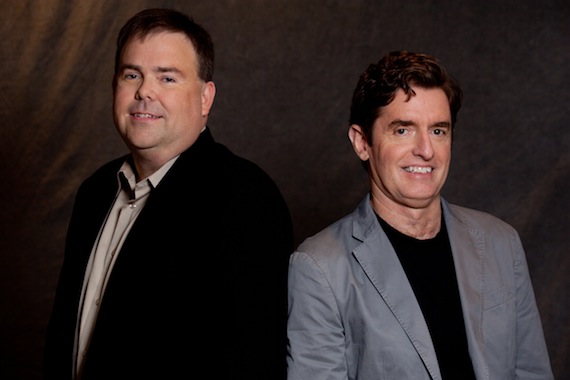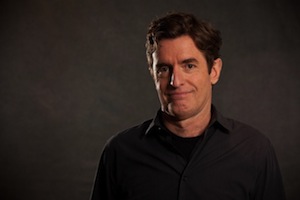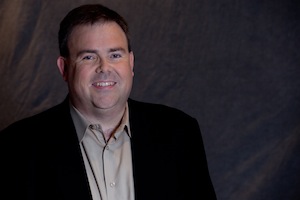

Pictured (L-R): Rob Taylor and Dwight Wiles of Wiles + Taylor & Co., LLC
Business managers and longtime colleagues Dwight Wiles and Rob Taylor have announced a new name for their firm: Wiles + Taylor & Co., LLC. The accounting offices were formerly known as Smith, Wiles & Co., a name that was kept for eight years out of respect for Gary Smith, a company founder who was killed in a hunting accident in 2008.
Taylor, who has worked for the firm for 20 years, has been promoted to Vice President and Partner. Over those same 20 years, the company has gradually grown from a small office on Music Row into a newly-expanded building in the Gulch. The inviting space is decorated with concert posters, autographed memorabilia, and original artwork from friends and loved ones. A comical painting of Wiles hangs in the employee kitchen, a clear display of reverence and irreverence.
Wiles, a former band manager and tour manager, changed career paths in the early 1990s, earning a Master’s degree and becoming a Certified Public Accountant. After a few years of having his own firm, he joined with Smith in 1995 to form Smith Wiles & Co. Leading up to the next phase of the business, Wiles and Taylor chatted with MusicRow about their philosophy of success.

Dwight Wiles
MusicRow: What were the conversations leading up to the name change?
Wiles: You mean over the past 20 years? (both laugh) This is something that has been developing for a long time. Rob has been invaluable to me and to the firm even before Gary’s death, but certainly after Gary’s death. We wanted to honor Gary but Rob has definitely earned his name on the building, so to speak. I hope he agrees with me but I think I’ve treated him as a partner for a long time. And it was time to make it official.

Rob Taylor
I know a lot of our readers will remember Gary. For those who didn’t know him, how would you describe his personality?
Taylor: He was really low-key. He didn’t get overly excited, no matter what was going on. From the tax side of things, he was definitely my mentor. But he cut up all the time, which is similar to us. We’re serious when we need to be, but we cut up a lot and we try to have fun here, and that’s what we want everyone else to be doing. He had the old cliché that he told me many times: “I just want to work hard and play harder.” He was a very steady, calming person. That’s how I always remember him.
That demeanor must attract clients, to see someone in the music business who is calm and collected.
Taylor: I think we both go after that same thing. We get people who get irate over what we might consider little things, but it’s very personal. We don’t take that for granted. But it’s nice for them. I get that a lot too: “You have such a calming sense about you and I am freaked out about the I.R.S.” So I help them through it and let them know we’re going to take care of it, and make that happen.
Are the roles changing along the name change? Or is it the same dynamic?
Wiles: I think it’s the same.
Taylor: As Dwight said, I’ve been treated like a partner for a long time. I think we complement each other well with our strengths and weaknesses. I’m not taking on any new, additional stuff. I already did. I think it’s more of a “making it official” kind of situation.
Wiles: You sure about that? (laughs)
Taylor: I guess Monday I’ll find out. (all laugh) I might see a to-do list!
One advantage you have at this company is perspective, and seeing what’s happened in Nashville over the last 20 years. How is that beneficial to you as a company?
Wiles: Well, my perspective is related solely to the music industry, so I can only comment on the music/entertainment industry. I’ve always enjoyed the community of Nashville and the music community. It’s hard to break into, but once you get in that club, it’s nice. From my perspective, Nashville is a fantastic place to live and raise a family. Hopefully it will stay like that. Who knows?
But the music industry, sure, it’s changed, but Nashville’s always been an artist-development town. I felt when I moved here that publishing companies really had a lot more to do with running this town, musically, than in L.A. or New York for example. I still think that’s true. It’s neat that hasn’t changed over all those years.
And the fact that Sony moved their publishing administration down here, and I hear rumors about other companies doing the same thing. That just says to me that we have a good music talent pool down here, probably because of Belmont and MTSU and there’s a lot of talented, inexpensive labor here, much more than you’re going to find in New York or Los Angeles.
From my standpoint, I think the industry has shrunk a little bit, with record companies and that sort of thing, but on the other hand, we’ve grown. Me, I’m optimistic about the music business. I think we’re going to figure out the digital streams and I think we’re going to figure out how the money flows to the artists and creators. We’ll figure out how to get them compensated fairly.
Is there a guiding principle that you’ve been using this whole time that you’re still using today?
Wiles: I think so. One of my mantras to the staff is “Do the right thing.” I mean, if you do the right thing, it should be OK. That’s about as simple as I can put it.
Taylor: We all have a passion and reward of helping somebody at the end of the day. If you’re always doing the right thing, and you’re able to help somebody, how do you go wrong?
Wiles: I think that’s a very key component to what we do. One of the rewards of our business is being able to help people. I mean, some of them have dreams of making a bunch of money and retiring early. Not many. And some of them just want to buy everything they can get their hands on. (laughs)
Taylor: And either way, we’re helping them! (all laugh)
Wiles: We try to lay down in front of the bus, and most of the time we get run over. (laughs) But I think our philosophy is that if you do the right thing, it’s going to be OK.



